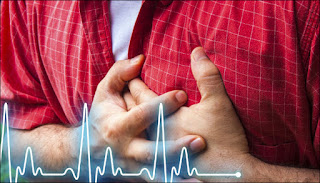CINICAL EVALUATION IS AS GOOD AS NON INVASIVE TEST FOR ACUTE CHEST PAIN IN EMERGENCY
Prof Dr,DRAM,HIV /AIDS,HEPATITIS ,SEX DISEASES & WEAKNESS expert,New Delhi,India, +917838059592
Patients experiencing chest pain often undergo imaging as CT Angiography and stress echocardiography tests that do not change treatment decisions, even when clinical examination with a simple Electro Cardiogram determines low risk of a cardiac event, according to a secondary finding from a retrospective analysis of the Rule Out Myocardial Ischemia/Infarction by Computer Assisted Tomography (ROMICAT-II) trial, presented at the 2017 Annual Scientific Sessions of the American Heart Association (AHA).
The only effects of noninvasive additional testing are prolonging a patient’s stay at the hospital and exposing patients to more ionising radiation, commented presenter David Brown, MD, Washington University.In the ROMICAT-II trial, investigators randomised 1,000 patients with acute chest pain into 2 groups that would receive either coronary computed tomography (CT) or stress testing to rule out a coronary event. In all, 118 patients decided not to have either test, and dropped out of the trial.
Dr. Brown and colleagues examined the drop-out group compared with the 882 patients who had additional testing, and found no differences in mortality between the groups (i.e., no deaths in either group). There also was no difference in the need for percutaneous coronary intervention (PCI) in the month following the index visit to the emergency department. The investigators found no difference in the need for coronary artery bypass graft surgery, and no difference in return trips to the emergency department in the next month. Finally, there was no difference in major acute cardiac events.
The hospital length of stay was 20.3 hours for patients who received no additional testing after an initial clinical evaluation compared with 27.9 hours for patients who received the extra testing. There was a greater cost for those patients who were tested, as well .
Patients who have the tests performed receive about 9.9 mSv of radiation more than patients discharged based on clinical evaluation, Dr. Brown noted.Lack of testing was associated with a lower rate of diagnosis of acute coronary syndrome) and less coronary angiography and PCI during the index visit.
- Kidney stones universally present hazard in north india,dillution by water prevent it
- Steroid and placebo effect equally for mild persisting asthma with low sputum eosinophils
- Government wants to fix public healthcare staff shortages with ayush docs: will it work?
- Plea in hc for payment of salaries of edmc, north mcd teachers and doctors
- 7 indian pharma companies named in us lawsuit over inflating generic drug prices
- Woman in up dies after explosion in her mouth during treatment,what is diagnosis?
- Woman in up dies after explosion in her mouth during treatment,what is diagnosis?
- Woman in up dies after explosion in her mouth during treatment,what is diagnosis?
- Air pollution ! mothers organising rally in london,anaesthetist choosing gas,will india follow?
- Cardiac arrest is always not sudden as understood -a study


 Comments (
Comments ( Category (
Category ( Views (
Views (